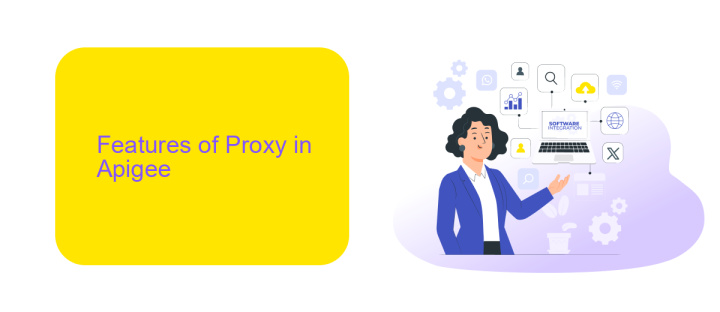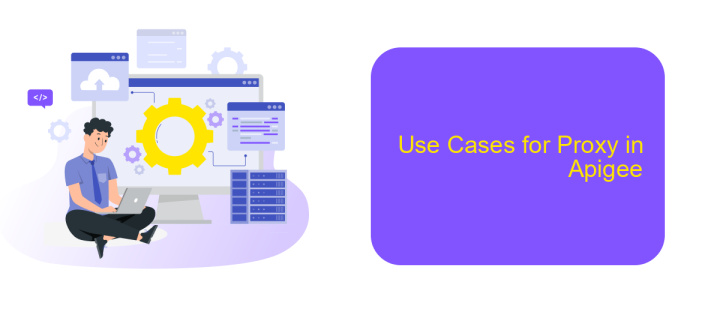What is Proxy in Apigee
A proxy in Apigee acts as an intermediary between client applications and backend services, enabling developers to manage, secure, and optimize API traffic. By offering features such as traffic management, security, analytics, and protocol transformation, Apigee proxies enhance the performance and reliability of APIs, ensuring seamless communication and robust protection for your digital ecosystem.
What is Proxy in Apigee?
In Apigee, a proxy acts as an intermediary between a client and backend services, enabling secure and efficient API management. By using a proxy, developers can control the flow of traffic, apply security policies, and monitor API performance without directly modifying backend services.
- Security: Enforce authentication, authorization, and data encryption.
- Traffic Management: Control rate limiting, quotas, and load balancing.
- Analytics: Monitor API usage and performance metrics.
- Transformation: Modify request and response formats.
- Integration: Seamlessly connect with other services like ApiX-Drive for enhanced automation and data synchronization.
Using proxies in Apigee simplifies the management of APIs, providing a centralized platform to enforce policies and ensure high performance. This approach not only enhances security and scalability but also allows for easier integration with third-party services, ensuring that your API ecosystem remains robust and flexible.
Features of Proxy in Apigee

Apigee proxies offer a range of features designed to enhance API management and streamline integration processes. One of the key features is traffic management, which allows you to control the flow of data between your APIs and clients. This includes capabilities like rate limiting, quotas, and spike arrest to ensure your services are not overwhelmed by excessive requests. Additionally, Apigee provides robust security features such as OAuth, API key validation, and threat protection to safeguard your APIs from unauthorized access and malicious attacks.
Another significant feature of Apigee proxies is the seamless integration with various backend services and third-party applications. For instance, you can use ApiX-Drive to automate data transfers and synchronize information between different platforms without manual intervention. This integration capability allows you to connect your APIs with CRM systems, databases, and other essential tools, thereby enhancing operational efficiency and data consistency. Furthermore, Apigee offers analytics and monitoring tools that provide insights into API performance, helping you optimize and troubleshoot issues in real-time.
Benefits of Using Proxy in Apigee

Using a proxy in Apigee offers numerous benefits that enhance the functionality, security, and efficiency of your API management. By acting as an intermediary between clients and your backend services, proxies provide a layer of abstraction that simplifies API interactions and management.
- Security: Proxies can help protect your backend services by enforcing security policies, such as authentication and authorization, thereby reducing the risk of unauthorized access.
- Traffic Management: They enable efficient traffic management by implementing rate limiting, quotas, and caching, which helps in handling large volumes of requests without overloading the backend.
- Transformation and Mediation: Proxies can transform requests and responses, enabling seamless integration between different systems and protocols. This is particularly useful when using services like ApiX-Drive for automating and streamlining integrations.
- Monitoring and Analytics: They provide detailed analytics and monitoring capabilities, allowing you to track API usage, performance, and detect anomalies in real-time.
- Scalability: Proxies facilitate scalability by distributing requests across multiple backend services, ensuring high availability and reliability.
Incorporating proxies in Apigee not only enhances the security and performance of your APIs but also simplifies the management and integration processes. By leveraging these benefits, organizations can ensure a robust and scalable API ecosystem.
Use Cases for Proxy in Apigee

Apigee proxies are essential tools for managing and optimizing API traffic. They act as intermediaries between clients and backend services, offering a layer of abstraction that simplifies API management. This allows developers to enforce policies, manage security, and monitor traffic without altering backend services.
One of the primary use cases for Apigee proxies is to enhance security. By acting as a gatekeeper, proxies can enforce authentication and authorization policies, ensuring that only authorized users can access the API. Additionally, they can filter out malicious requests and protect against common security threats like SQL injection and cross-site scripting (XSS).
- Traffic Management: Proxies can handle rate limiting, load balancing, and caching to ensure optimal performance and reliability.
- API Transformation: They can transform requests and responses, making it easier to integrate with different systems and formats.
- Monitoring and Analytics: Proxies provide detailed insights into API usage, helping to identify bottlenecks and optimize performance.
- Integration with Third-Party Services: Tools like ApiX-Drive can be used to automate data flows between Apigee and other applications, enhancing the overall functionality.
In summary, Apigee proxies offer a versatile solution for managing APIs, providing enhanced security, performance optimization, and seamless integration capabilities. By leveraging these proxies, businesses can ensure their APIs are robust, secure, and scalable.
Conclusion
In conclusion, understanding and utilizing proxies in Apigee is essential for managing and securing your APIs effectively. Proxies act as intermediaries that handle requests and responses, allowing you to implement policies for authentication, authorization, rate limiting, and more. This not only enhances the security but also improves the performance and reliability of your APIs by offloading tasks from backend services.
For those looking to streamline their API integrations further, services like ApiX-Drive can be invaluable. ApiX-Drive simplifies the process of connecting various applications and automating workflows, reducing the complexity of manual integrations. By leveraging both Apigee proxies and ApiX-Drive, businesses can achieve a more robust and efficient API management strategy, ensuring seamless communication between different services and applications.
- Automate the work of an online store or landing
- Empower through integration
- Don't spend money on programmers and integrators
- Save time by automating routine tasks
FAQ
What is a proxy in Apigee?
How do I create a proxy in Apigee?
What are the main components of an Apigee proxy?
How can I secure my API proxy in Apigee?
Can I automate the deployment and configuration of Apigee proxies?
Apix-Drive will help optimize business processes, save you from a lot of routine tasks and unnecessary costs for automation, attracting additional specialists. Try setting up a free test connection with ApiX-Drive and see for yourself. Now you have to think about where to invest the freed time and money!


